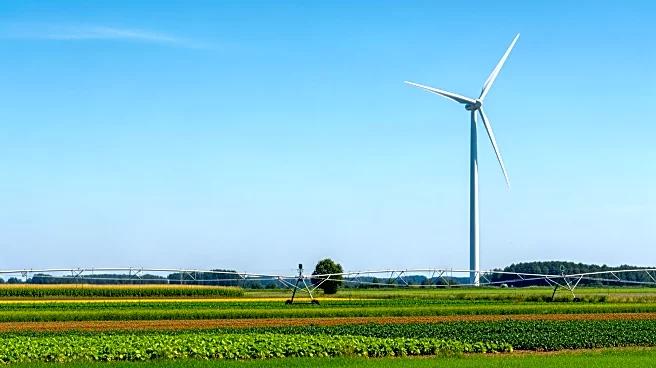What's Happening?
A recent article discusses the need to reform agricultural subsidies as part of a broader social welfare effort to support climate-smart agriculture. The transition to agriculture that is resilient to climate shocks
and reduces its environmental footprint is crucial for the future of the planet. Current subsidy programs, particularly those focused on inorganic fertilizers, are not always effective in improving productivity or enabling climate-smart practices. For example, Malawi is piloting a system where support for inorganic fertilizers is conditional on practices like legume intercropping and agroforestry. This approach aims to inspire new commitments at the Global Climate-Smart Agriculture conference in Brasília. The article emphasizes that agricultural subsidies should be part of a comprehensive social welfare strategy to address inequalities and support smallholder farmers.
Why It's Important?
The reform of agricultural subsidies is significant as it addresses fundamental inequalities that hinder smallholder farmers, who often lack access to resources and finance. By repurposing subsidies to support climate-smart practices, the initiative aims to enhance yields, livelihoods, and food security. This transition is vital for reducing poverty and food insecurity, ensuring a just rural transition. The integration of social welfare programs, such as cash transfers and food for work initiatives, can uplift rural communities and build climate resilience. The collaboration between agricultural ministries and those dealing with welfare and social development is essential for a holistic approach to sustainable agriculture.
What's Next?
The next steps involve governments investing in digital infrastructure and data-gathering systems to identify households for agricultural subsidies and safety net programs. Ministries of trade, health, and education can play a role in ensuring markets for diverse produce, while job creation initiatives can help households transition to non-farming jobs in areas affected by climate change. The Global Climate-Smart Agriculture conference in Brasília is expected to inspire new commitments to support the Action Agenda, focusing on climate-smart practices and social welfare integration.
Beyond the Headlines
The deeper implications of this development include ethical considerations of ensuring a just transition for farmers who depend on agriculture for their livelihoods. The integration of social welfare programs with agricultural subsidies highlights the need for a whole-of-government effort to address the challenges faced by rural communities. This approach not only supports climate resilience but also aims to reduce agricultural emissions, contributing to global efforts to combat climate change.











